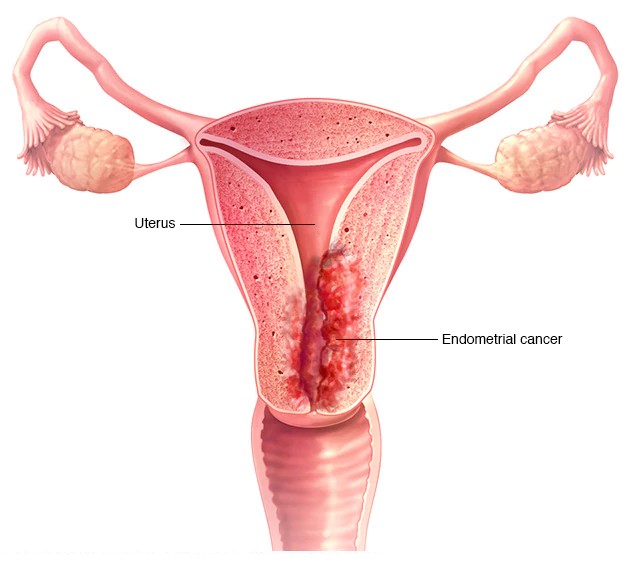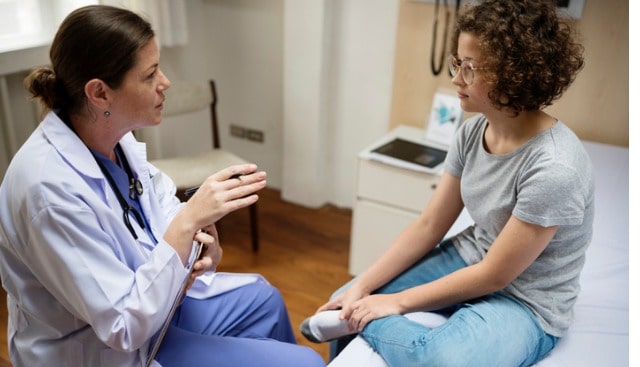- Home
- Gynecology Cancers
- Endometrial Cancer
Endometrial Cancer Treatment - Expert Gynecologic Oncologists
“Endometrial cancer starts in the layer of cells that form the lining of the womb, called the endometrium. It is a cancer of the womb, or uterus.”
Most uterine cancers start as endometrial cancer. Another type of cancer, uterine sarcoma, starts in the muscles and tissues of the uterus. Endometrial cancer and uterine sarcoma usually have different treatments.
Early symptoms include unusual bleeding, such as after menopause or between periods.
Endometrial cancer can also cause pain in the pelvic area, less commonly during sexual intercourse. Some people also experience pain when urinating or difficulty emptying the bladder.
As the cancer progresses, there may be:
» A feeling of a mass or heaviness in the pelvic area
» Unintended weight loss
» Fatigue
» Nausea
» Pain in several parts of the body, including the legs, back, and pelvic area
These symptoms can also stem from other, noncancerous health problems, such as fibroids, endometriosis, endometrial hyperplasia, and polyps in the uterine lining.
It is important to rule out endometrial cancer if another condition is causing similar symptoms.

SYMPTOMS OF CERVICAL CANCER:
Given below are the most common types of cervical cancer symptoms:
» Abnormal vaginal bleeding
» Spotting or bleeding between periods
» Heavier or longer heavier menstrual periods than the usual
» Pain during sexual intercourse
» Back pain
» Fatigue
» Leg pain
» Pelvic pain
» Single swollen leg
» Weight loss
» Heavier periods than usual
» Vaginal bleeding after sex
» Vaginal bleeding after menopause
» Other abnormal vaginal discharge
Many initial symptoms may coincide with other reproductive conditions, making it harder to spot the issue early on.
Risk factors for endometrial cancer
People exposed to high levels of estrogen may have an increased risk of endometrial cancer.
The risk is greater for those who:
» have never been pregnant
» start menstruating before 12 years of age
» experience menopause after 55 years of age
The risk is greater for those who:
» Using estrogen-only hormone therapy after menopause
» Using Nolvadex to prevent or treat breast cancer
» Having had previous radiation therapy to the pelvis
» Having a family history of uterine cancer
» Having polycystic ovary syndrome, or PCOS
» Having diabetes, obesity, hypertension, or other aspects of metabolic syndrome
» Having endometrial hyperplasia
Causes Endometrial Cancer
It is not usually possible to say what causes cancer in a particular woman but known risk factors are:
» Overweight or obese
» Over 50 years and have gone through menopause
» Endometrium grows too thick (known as endometrial hyperplasia)
» one or more people in your family has had endometrial, bowel, breast or ovarian cancer, or Lynch syndrome (known as hereditary non-polyposis colorectal cancer – HNPCC)
» You take an oestrogen hormone replacement that does not have progesterone
» You are taking the drug tamoxifen (which is used to treat breast cancer)
» You have high blood pressure (known as hypertension) and diabetes
» You have never had children
» You have had pelvic radiation in the past to treat another cancer
» You have a tumour in one of your ovaries
» You have polycystic ovary syndrome (PCOS).
Endometrial cancer is rising in incidence and is most likely due to the rising incidence of obesity.

Diagnosis
If you have symptoms that might be linked to endometrial cancer your doctor will most likely:
» ask you questions about the history of the health of you and your family
» examine you
» do a blood test
» examine your vagina and and cervix using a speculum (like that used in a cervical screening test) to open your vagina
» do an ultrasound of your uterus by putting a small wand (called a transducer) into your vagina to take a picture of your cervix, uterus, endometrium and ovaries
» they may also need to take and test a sample (or biopsy) of your endometrium. This can be done without anasethetic in a day clinic with a thin tube (or pipelle) which is put into your uterus (through your vagina) and gently sucks up a small sample of cells.
Treatment
The kind of treatment you have will depend upon:
» The size of the cancer and where it is in your body (this is known as the stage of cancer)
» How quickly it is growing (the grade of cancer)
» Where in the endometrium it started (the type of cancer)
» Your age, health and medical history.
Your doctors will discuss these things with you and help choose the possible treatment for your particular cancer, lifestyle and wishes.
Treatment options
» Surgery
» Radiotherapy
» Chemotherapy
» Hormonal therapy
After treatment
Eating well and being active after treatment for endometrial cancer is important for your recovery. It improves your health and wellbeing and reduces your risk of developing conditions such as heart disease and diabetes. Keeping a healthy weight, eating well and leading an active lifestyle may even lower your risk of other cancers developing in the future.

